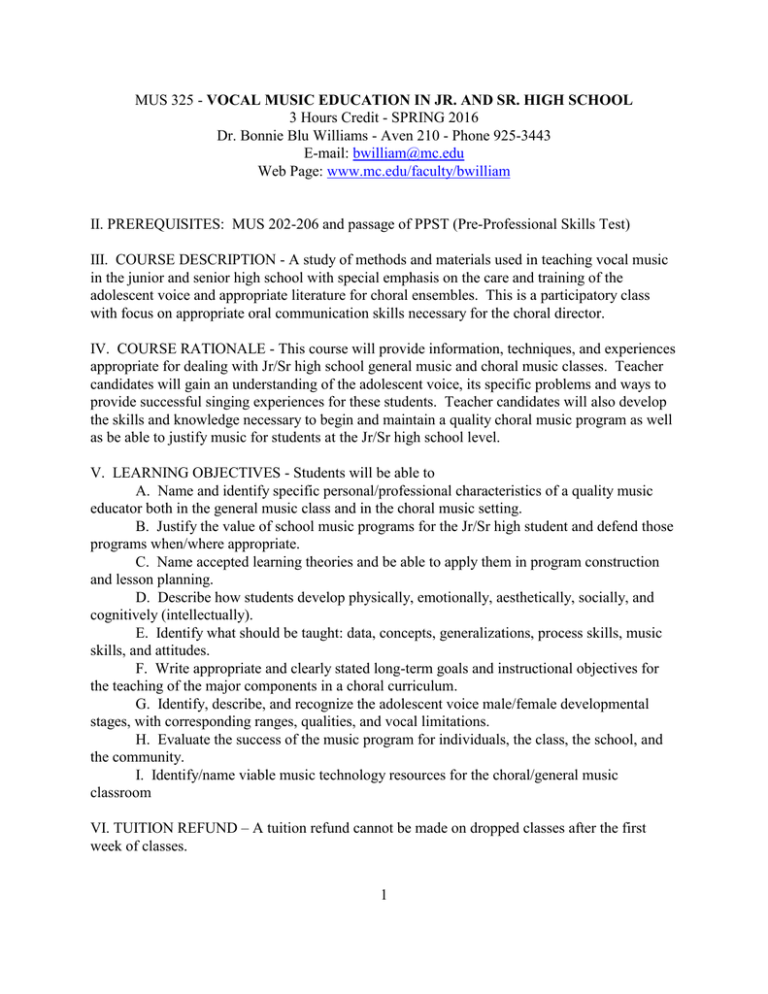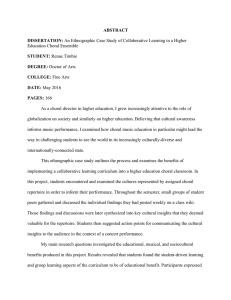VOCAL MUSIC EDUCATION IN JR. AND SR. HIGH SCHOOL
advertisement

MUS 325 - VOCAL MUSIC EDUCATION IN JR. AND SR. HIGH SCHOOL 3 Hours Credit - SPRING 2016 Dr. Bonnie Blu Williams - Aven 210 - Phone 925-3443 E-mail: bwilliam@mc.edu Web Page: www.mc.edu/faculty/bwilliam II. PREREQUISITES: MUS 202-206 and passage of PPST (Pre-Professional Skills Test) III. COURSE DESCRIPTION - A study of methods and materials used in teaching vocal music in the junior and senior high school with special emphasis on the care and training of the adolescent voice and appropriate literature for choral ensembles. This is a participatory class with focus on appropriate oral communication skills necessary for the choral director. IV. COURSE RATIONALE - This course will provide information, techniques, and experiences appropriate for dealing with Jr/Sr high school general music and choral music classes. Teacher candidates will gain an understanding of the adolescent voice, its specific problems and ways to provide successful singing experiences for these students. Teacher candidates will also develop the skills and knowledge necessary to begin and maintain a quality choral music program as well as be able to justify music for students at the Jr/Sr high school level. V. LEARNING OBJECTIVES - Students will be able to A. Name and identify specific personal/professional characteristics of a quality music educator both in the general music class and in the choral music setting. B. Justify the value of school music programs for the Jr/Sr high student and defend those programs when/where appropriate. C. Name accepted learning theories and be able to apply them in program construction and lesson planning. D. Describe how students develop physically, emotionally, aesthetically, socially, and cognitively (intellectually). E. Identify what should be taught: data, concepts, generalizations, process skills, music skills, and attitudes. F. Write appropriate and clearly stated long-term goals and instructional objectives for the teaching of the major components in a choral curriculum. G. Identify, describe, and recognize the adolescent voice male/female developmental stages, with corresponding ranges, qualities, and vocal limitations. H. Evaluate the success of the music program for individuals, the class, the school, and the community. I. Identify/name viable music technology resources for the choral/general music classroom VI. TUITION REFUND – A tuition refund cannot be made on dropped classes after the first week of classes. 1 VII. ACADEMIC INTEGRITY - Mississippi College is based on Christian principles. It is therefore assumed that all students in this course will conduct themselves with the highest regard for personal ethics, integrity, and honesty. Plagiarism will not be tolerated! VIII. TOPICS TO BE COVERED A. Body, Breath, Vocalises B. European Roots of Choral Music C. Choral Music in America D. Personal Philosophy E. Learning Theories in Choral Music F. Teaching Strategies G. Adolescent Development H. Changing Voices, Girls & Boys I. Vocal Improvising & Arranging J. Adolescent Voices & Choral Music K. Programming L. Lesson Planning & Curriculum Dev M. Music Literacy N. Rehearsal Techniques O. Classroom Management P. General Music Classes Q. Special Learners R. Technology S. NAfME T. National Standards for the Arts in Music U. Mississippi Fine Arts Framework IX. METHODS OF INSTRUCTION A. Lecture B. Large & small group discussions C. Listening via Internet/CD D. Video/DVD viewing E. Teacher modeling & demonstration F. Exams X. REQUIRED PRACTICES A. Reading of the Text B. Music Education Journal Articles C. Student Obs - video/DVD/ schools D. Music Lesson Planning E. Out-of-class Videos/DVD/Internet F. Improvising & Arranging Choral Parts G. Individual Proficiency: Vocal Score H. Examination of Music Series Materials I. Peer Teaching J. Supervised Teaching in Schools K. Choral Programming L. Oral Presentations to Class XI. REQUIRED INSTRUCTIONAL MATERIALS A. Teaching Choral Music (1999) 2nd Ed. Don L. Collins, Prentice Hall: Englewood Cliffs, NJ B. Journal Articles as assigned C. Internet readings/viewings as assigned XII. INSTRUCTIONAL MATERIALS IN AVEN ROOM 403 A. Music Series Texts Music Connection, (2000), grades 7-8, Silver Burdett & Ginn Music Connection, (1995), grades 7-8, Silver Burdett & Ginn Share the Music (1997), grades 7-8, McGraw Hill B. Videos/Books/CD ROMS – See your individual project sheets for the call numbers and location of your sources. 2 XII. COURSE EVALUATION 75 points - Exam #1 - Chapters 11, 8, & 13 75 points - Exam #2 - Chapters 7, 10, & 14 50 points - Final Exam - Chapters 4, 6, 15, 1, & 2 200 points - Class participation, assignments, readings, teachings, discussions, observations, lesson plans, programs, projects, pop quizzes, etc. 100 points - In School Observations & Teachings Grading Scale 94 to 100 = A = 470 to 500 points 86 to 93 = B = 430 to 469 points 75 to 85 = C = 375 to 429 points 70 to 74 = D = 350 to 374 points ATTENDANCE - DO NOT MISS! The Mississippi College attendance policy (absences exceeding 25%) will be strictly observed - 12 absences for a course that meets 3 times a week, 8 absences for a course that meets 2 times a week, and 4 absences for a course that meets once a week - constitute an F in the course. In addition, the policy in this class will be that you may miss 2 class periods, excused or unexcused. The 3rd absence will constitute a drop of a letter grade from the final grade earned. Four absences will lose 2 letter grades, etc. See the Professor for extenuating circumstances. Consistently arriving late to class will constitute a tardy. Two tardies will equal one absence. XIV. ADDITIONAL COURSE INFORMATION A. All teaching, presentations, & etc will be heavily graded on appropriate communication skills, including body language, correct music terminology as well as correct language usage, and overall exceptional presentation skills. B. Late projects, teachings, assignments, etc - will lose 10% of the total points possible for that graded assignment. See the professor in ADVANCE for extenuating circumstances. C. All written papers/projects/assignments/etc. must show high academic standards. Therefore, one point will be lost for every 2 spelling, grammatical, or typographical errors on everything turned in for this course. Exams are included. D. Should you be absent for any reason, it is your responsibility to find out what you missed. There will be no make-up on points lost from daily participation without professor consent in advance. E. Student Counseling Services is located in Alumni Hall Room #4 or they may be contacted via email at christia@mc.edu or rward@mc.edu. You may also reach them by phone at 601-925-7790. F. EARLY ALERT – “red flag” behaviors will be noted early and notice will be sent to the student, advisor, & Office of Student Success. 3 4

